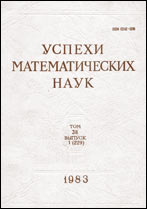|
This article is cited in 75 scientific papers (total in 75 papers)
Duality of convex functions and extremum problems
A. D. Ioffe, V. M. Tikhomirov
Abstract:
Let $\mathfrak{X}$ be a real linear topological space and $\mathfrak{Y}$ its conjugate. We denote by $\langle x,y\rangle$ the value of the linear functional $y\in\mathfrak{Y}$ on the element $x\in\mathfrak{X}$. For real functions $f(x)$ on $\mathfrak{X}$ we introduce two operations: the ordinary sum
$$
f_1(x)+f_2(x)
$$
and the convolution
$$
f_1\oplus f_2(x)=\inf_{x_1+x_2=x}(f_1(x_1)+f_2(x_2)),
$$
and also the transformation associating with $f(x)$ its dual function on $\mathfrak{Y}$ which is obtained from $f(x)$ by the formula
$$
f^*(y)=\sup_{x\in\mathfrak{X}}(\langle x,y\rangle-f(x)).
$$
The following propositions hold.
1) The operation ${}^*$ is involutory:
$$
f^{**}=f
$$
if and only if $ f(x)$ is a convex function and lower semicontinuous on $\mathfrak{X}$.
2) $(f_1\oplus f_2)^*=f_1^*+f_2^*$.
3) Under certain additional assumptions
$$
(f_1+f_2)^*=f_1^*\oplus f_2^*.
$$
These theorems were proved for a finite-dimensional space by Fenchel [93] and in the general case by Moreau [60].
Chapter I is concerned with proving these theorems and generalizations of them.
Chapter II is concerned with their application to mathematical programming and the calculus of variations. Proofs are given of very general duality theorems of mathematical programming and saddle point theorems. Constructions are then given which lead to extensions of optimal control problems, and an existence theorem is proved for these problems.
Chapter III contains an investigation of problems of approximating $x\in\mathfrak{X}$ and the set $C\subset\mathfrak{X}$ by an approximating set $A\subset\mathfrak{X}$ using methods of the theory of duality of convex functions. Duality theorems for some geometric characteristics of sets in $\mathfrak{X}$ are derived at the end of the chapter.
Citation:
A. D. Ioffe, V. M. Tikhomirov, “Duality of convex functions and extremum problems”, Russian Math. Surveys, 23:6 (1968), 53–124
Linking options:
https://www.mathnet.ru/eng/rm5684https://doi.org/10.1070/RM1968v023n06ABEH001251 https://www.mathnet.ru/eng/rm/v23/i6/p51
|


| Statistics & downloads: |
| Abstract page: | 2085 | | Russian version PDF: | 1026 | | English version PDF: | 86 | | References: | 133 | | First page: | 5 |
|




 Contact us:
Contact us: Terms of Use
Terms of Use
 Registration to the website
Registration to the website Logotypes
Logotypes








 Citation in format
Citation in format 
